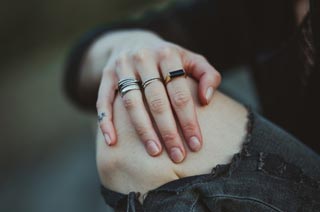When your knee hurts, day after day, you are unable to walk easily. Climbing up and down the stairs is a big challenge. You are unable to sleep through the night because of the pain. It just doesn’t let you live freely!
Osteoarthritis is one of the most common causes of chronic knee pain. It leads to inflammation, stiffness, and pain, making it difficult to flex and extend your knee.
Doctors throughout the USA are striving to avoid prescribing medication, especially opioids, for chronic pain. Fortunately, acupuncture is emerging to be a cost-effective method to treat pain with very little risk for the patient.
As a matter of fact, the national guidelines for physicians recommend acupuncture as one of the treatments for osteoarthritis-induced knee pain.
Acupuncture Benefits for Knee Pain
Acupuncture can offer much-needed relief for those experiencing knee pain.
When the acupuncture needles are placed on the body, a signal is sent to the brain that might trigger the release of endorphins – often referred to as “feel good” hormones. According to scientists, this can help reduce pain. In addition, acupuncture can also decrease the production of cortisol (a hormone that helps control inflammation) in the body. With fewer pain sensations along with reduced inflammation after acupuncture sessions, knee function and mobility can potentially improve on a short-term basis.
In 2019, acupuncture received a conditional recommendation in the treatment of osteoarthritis of the knee in the American College of Rheumatology/Arthritis Foundation Guideline for the management of the osteoarthritis of the knee, hand, and hip.
What Does Research Say About Acupuncture for Knee Pain?
Several clinical studies support acupuncture’s ability to alleviate knee pain. A particular study of 18,000 participants found that acupuncture is beneficial for managing several conditions that lead to chronic pain, including knee pain.
This study discovered considerable differences between actual and “fake” acupuncture during the trial. This shows that acupuncture does effectively minimize inflammation and pain.
Another scientific review analyzed past studies on pain management interventions post knee surgery and discovered that acupuncture delays and decreases the use of opioid medication to alleviate post-surgery pain.
Osteoarthritis
A systematic review examined ten randomized control studies to identify if acupuncture decreased pain and enhanced joint function in people suffering from chronic knee pain caused by osteoarthritis.
Participants were provided between six to twenty-three sessions of acupuncture at least once a week for three to thirty-six weeks. The analysis found that acupuncture can enhance long and short-term mobility and physical function and appears to offer short-term pain relief (for approximately 13 weeks) in people suffering osteoarthritis-induced knee pain.
Chronic Knee Pain
A particular study discovered that acupuncture is usually quite effective in the short term. In the research, both laser and needle acupuncture leads to mild improvements in pain at 12 weeks.
What Is Knee Pain?
Many individuals experience knee point at some point in their lives. Exercise, sports, and other activities can lead to tendinitis, muscle strains, and other serious injuries to the cartilage and ligaments.
It’s hard to pinpoint the exact number of individuals who suffer knee pain in their life. However, we do know the rates of how many individuals experience pain severe enough to opt for knee replacement surgery. In 2017, there were over 950,000 knee replacement surgeries performed in the USA alone.
The severity of knee pain can differ widely and depends on factors like your age and the cause of knee pain. For some individuals, knee pain can be so severe that it hinders everyday activities. However, for others, mild knee pain can be a chronic obstacle to the active lifestyle they want.
The location of knee pain can also differ from person to person. For instance, according to the Clinical Journal of Pain, the most commonly reported location of knee pain is in the middle of the knee, in the joint that connects the thighbone with the shinbone. Other than that, individuals also experience knee pain is in the kneecap area.
Symptoms of Knee Pain
The severity of knee pain can vary, from a minor ache to debilitating and severe pain. Thus, the symptoms of chronic knee pain are also different for each person. Some of the other symptoms and signs accompanying knee pain include:
- Difficulty walking or weight-bearing due to instability of the knee
- Difficulty climbing up or going down the stairs due to ligament damage
- Limping because of discomfort
- Swelling and redness
- Inability to bend the knee
- Inability to extend the knee
- Dull, burning discomfort
- Sharp, shooting pain in the knee
- Constant ache.
Causes of Knee Pain
There are three main causes of knee pain:
- Acute Injury includes a torn ligament, meniscal tear, or a broken bone.
- Medical Conditions including infections, osteoarthritis, rheumatoid arthritis
- Chronic Use and Overuse Conditions include chondromalacia, osteoarthritis, patellar syndromes, bursitis, tendinitis, and IT band syndrome.
How Does Traditional Chinese Medicine View Knee Pain?
According to traditional Chinese medicine, knee osteoarthritis is categorized into –
- Yang deficiency cold stagnation
- Kidney essence deficiency
- Blood stasis and collateral stagnation.
The key symptoms of yang deficiency cold stagnation include stiffness, pain, and impaired function in the knee joint that gets better with warmth and worse with cold. The patient generally experiences fatigue, coldness, and heaviness in the limbs.
The primary symptoms of kidney essence deficiency include dizziness, tinnitus, and limited motion.
The main symptoms of blood stasis and collateral stagnation are limited motion, purplish lips, fixed pain, and a dark face.
Conclusion
If you are experiencing knee pain, you should surely think of getting acupuncture treatments to relieve the pain associated with your condition. Nevertheless, it is vital that you obtain treatment from a professional who has met standards for training and education in acupuncture.
American College of Acupuncture and Oriental Medicine (ACAOM) is the only acupuncture and herbal clinic affiliated with a specialized medicine institution in Houston. You can call us today at 713-780-9786 to book an appointment with us today. The college also offers acupuncture treatments at Houston Methodist Hospital. Call 713-441-5980 for an appointment.
 Our Degree Programs
Our Degree Programs